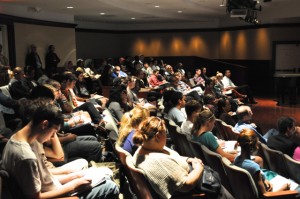By Gabrielle Beacken
Correspondent
A professor of ethics and bioethics took the Library Auditorium stage on Tuesday, Sept. 24 to present his philosophical theories of “Present Accountability for Future Harms.”
Before earning his doctorate in philosophy at Stanford University, Mark Greene, a professor in the philosophy department at the University of Delaware, completed a degree in veterinary science at Bristol University in the United Kingdom. After exploring the veterinary field, Greene began taking philosophy classes in his free time at the University of Oxford.
“I’d love to credit myself for inventing this,” Greene said on the theory of “Present Accountability for Future Harms. I’m just picking up one thread in a conversation.”

The non-identity problem has been prevalent since the ’80s and was standard work of the ethics in the 20th century, according to Greene.
“Philosophers are always unsatisfied with the current solution we have so far,” Greene said.
This U.K. native split his presentation into three parts he titled “Pars Prima,” “Pars Secunda” and “Pars Tertia.” At the inception of the presentation, the “Nonidentity Problem” was immediately addressed and linked to the environmental actions “depletion” and “conservation.”
Greene attributed a slide of research to the coordinator of the event, Melinda A. Roberts, professor in the department of philosophy and religion and pre-law advisor at the College. Roberts made the point that depletion probably changes who will exist in the future. The striking word “probably” indicates that there is no way of knowing if actions today affect nonexistent people.
When discussing future nonexistent people, Greene would reference the seventh generation from now. A question often repeated during the lecture was: “Would the seventh generation’s quality of life be better or the same post-depletion or post-conservation?”
Through the use of hypothetical mathematical equations, Greene projected that post-depletion people and post-conservation people would have a similar level of well-being and happiness, despite depletion consequences.
“The seventh generation owes their existence to depletion,” Greene said.
Even though rising sea levels and energy prices may be two consequences, this unknown seventh generation is subject to post-depletion and their exclusive existence is based on the actions and decisions of people today.
The professors and the audience began to spark an interesting and entertaining philosophical debate. Pierre LeMorvan, associate professor of philosophy and coordinator of religious studies, argued about the alternative nonexistent people.
Utilizing the Holocaust as an example, LeMorvan argued that if the Holocaust never happened, a different set of humans would have existed. Due to this tragedy in history, children of survivors owe their very existence to the Holocaust. Greene pointed out that “using hindsight is cheating.” It will simply never be known who or what could’ve been if the Holocaust never occurred and a different set of people existed.
“Many issues tackled in presentations like this have real-world implications,” LeMorvan said, commenting on the importance of philosophy lectures on campus. “It offers perspectives on cutting-edge work being done outside of TCNJ.”
Morton Emanuel Winston, professor of philosophy, conducted an extended debate with Greene about the difference between the definition of the words harmed and wronged. “Can people be harmed without being wronged? Can people be wronged without being harmed?” Winston asked.
“Two bad things can happen at a talk,” Greene said. “One, someone says something ‘right’ against your point and completely destroys the whole thing. The second-worst is everyone agrees with you. That means you’re saying something too obvious to be worth anything.” Greene not only accepts arguments from fellow philosophers, but also desires and encourages it as well.
“Everything I say is true, except for the false things,” Greene confessed. “If only I could tell the difference.”






